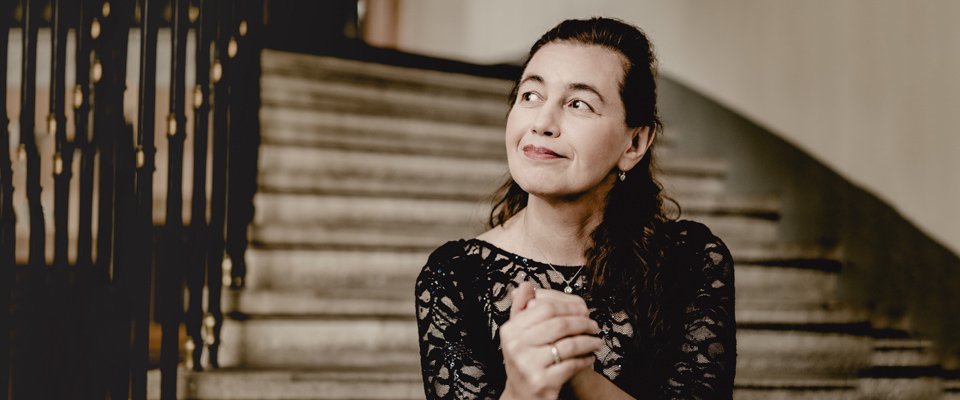For Lilya Zilberstein, Rachmaninoff runs in the blood—and can be played in defiance
The star pianist, who left Russia 33 years ago, also plays Schubert and Liszt at Vancouver Chopin Society solo concert
Lilya Zilberstein. Photo by Andrej-Grilc
The Vancouver Chopin Society presents Lilya Zilberstein at the Vancouver Playhouse at 3 p.m. on Sunday, September 24
LILYA ZILBERSTEIN MIGHT NOT be quite as much of a household name as her occasional piano-four-hands partner Martha Argerich, but there are good reasons for that.
Since leaving her native Russia in 1990, she has been splitting her time between performing and teaching, with her duties at both the Accademia Musicale Chigiana in Siena, Italy, and the University of Music and Performing Arts in Vienna, Austria, keeping her more than fully employed. She’s also raised two boys, Daniel and Anton Gerzenberg, with her German husband, and they might be the best evidence yet for her pedagogical prowess.
“They’re both pianists,” Zilberstein explains, speaking in capable but heavily accented English from her home in Vienna. “One is working with singers, as a pianist and as a coach. My other son is two years younger, and he won two years ago the Concours Géza Anda competition, and is also playing concerts in his own career. Sometimes we play together; in May we were in Guadalajara, Mexico, for one week. I played one concert solo, they played two pianos as a duo, and then we played several pieces six hands on one piano.
“It was really fun,” she adds happily.
Zilberstein’s upcoming Vancouver Chopin Society appearance will be a solo affair, but there’s a link to her Mexican concerts: in Guadalajara her sons honoured the 150th anniversary of Sergei Rachmaninoff’s birth by playing his Symphonic Dances, while here she will perform her Russian countryman’s 13 Preludes.
Rachmaninoff was obviously popular in the Zilberstein/Gerzenberg household; as Anton recently told an ArtHereArtNow interviewer, his “music is close to me, which mostly comes from my family”. But there’s another connection: like Rachmaninoff, Zilberstein exiled herself from her native land due to concerns over its direction.
“He was much more unhappy,” she allows, “because he left very near to the October Revolution, and his grand piano was thrown out of the window from the second floor. I didn’t have this trouble, but I also had trouble, and I left in September of 1990. Three days ago it was exactly 33 years since I left Russia.
“I did go back several times, for very short times, like three days,” she continues. “But the last time was almost five years ago, and I don’t know if I will ever go back there because of the political situation now. Two weeks ago I gave a master class with two Ukrainian students, and they said that maybe first I should go to Kyiv, before I go to Moscow, if this war will end sometime.”
It’s fair to say that playing Rachmaninoff in Vancouver is a subtle criticism of Vladimir Putin’s regime. “We cannot cancel Rachmaninoff; that is not correct,” Zilberstein says. “So I play his music, and I feel very connected to his music. I was born in Russia and studied there, so what can I do?”
Otherwise, there’s no particular theme or thesis to Zilberstein’s program, which will also include Franz Schubert’s 6 Moments Musicaux and Fran’s Liszt’s piano transcriptions of four Schubert lieder, and was chosen with input from the Chopin Society. These are pieces that allow her to display her gift for musical storytelling, she says, and while such stories can be abstract, there’s always some kind of narrative behind her musical choices.
“Of course there are pieces like Pictures at an Exhibition by Mussorgsky or Symphonie Fantastique by Berlioz or The Seasons from Tchaikovsky that mean something—months or years or nature,” she explains. “But what I mean is that every piece that I play, it has some, let’s say, development. There is a beginning, something that happens inside, and there is the end. It’s like any story that we tell: we start from the beginning, we say what happened yesterday or last month or last year or five centuries ago, and then we end the story.
“I will play, for example, Schubert’s 6 Moments Musicaux, and they are all pieces which start with a theme and then develop. And if we take the 4 Lieder, the Schubert/Liszt transcriptions, they’re lieder, so there are words there, and they are kind of stories. They tell something. I don’t know if they will print the words in the program, but maybe it’s not a bad idea!”
Knowing the German and Shakespearean poems that inspired Schubert’s songful originals would indeed aid listeners in following Zilberstein’s nuanced interpretations, but having them at hand is hardly necessary. This is one pianist whose impeccable skills and emotional commitment can clearly speak for themselves.













